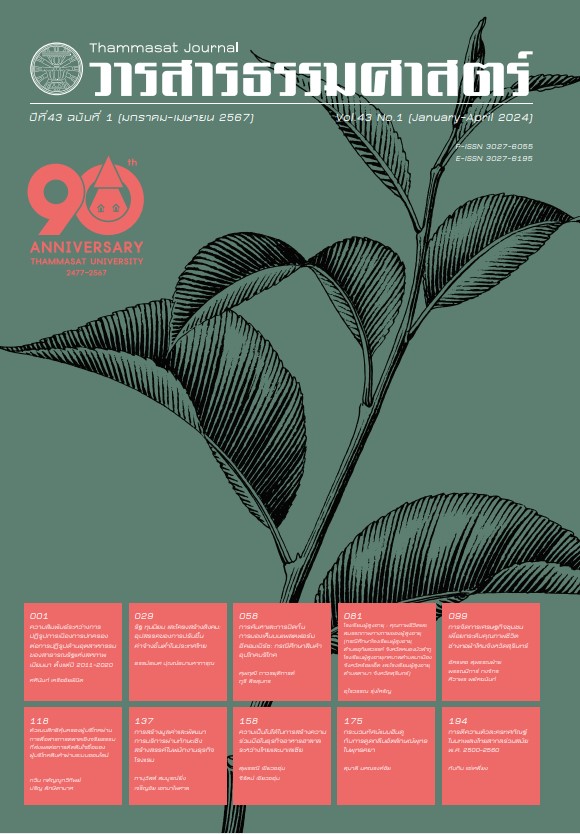Potentiality in Business Cooperation in Halal Food Business between Thailand and Malaysia
Main Article Content
Abstract
Thailand and Malaysia have high potential to compete in the halal food industry. Thailand’s advantages are a wealth of raw materials, standardized production process, and a diverse range of high-quality foods. Malaysia’s strengths are distribution and marketing. The objectives of this qualitative research are to 1) examine and evaluate the existing halal food industry cooperation between Thailand and Malaysia and 2) exploring the potential for developing such cooperation. A total of 203 informants were collected. Data were gathered through document analyses, interviews, focus groups, and observation. Content analysis was used to analyze the data. The results regarding the first objective revealed that the government cooperation in a policy that has not yet been implemented in practice. However, it was discovered that private sector collaboration has led to concrete actions, including Original Equipment Manufacturer (OEM) agreements, distribution through distributors, cross-border trade, and financial support. Based on historical and current developments, collaboration between Thailand and Malaysia in the halal food industry is uncertain. The results regarding the second objective revealed that considering the future trend in fostering international collaboration of both the regional and global levels, Thailand and Malaysia cannot resist working together in the halal food industry. Suggestions include proactive marketing and public relations based on the benefits of Thai halal food, increasing halal tourist potential by promoting Thai cuisine, and proactive efforts by pertinent organizations to respond to the expansion of halal food industry.
Article Details
References
กิิตติิ เจิิดรัังษีี. (2550). โครงการส่่งเสริิมและพััฒนาอาหารฮาลาลให้้เป็นสินค้าส่งออก. สำนักงานคณะกรรมการวิจัยแห่งชาติ.
ฐานเศรษฐกิจออนไลน์. (2559). คอลัมน์ SMEs News. “กระทรวงการต่างประเทศหนุนนำกระพือฮาลาลไทย”. http://www.thaibiz.net/th/news/detail.php?ID=16705&sphrase_id=3930234.
ธนาคารเพื่อการส่งออกและนำเข้าแห่งประเทศไทย. (2021). เจาะตลาดอาหารฮาลาล ท่่ามกลางการระบาด COVID-19. https://www.ditp.go.th/contents_attach/709499/709499.pdf
นันทรัตน์ ตั้งวิฑูรธรรม และวรรณสินท์ สัตยานุวัตร. (2560). การตระหนักรู้้และความคาดหวังต่อตราสัญลักษณ์์ฮาลาลในอาเซียนของผู้บริโภคชาวมุสลิมในอาเซียนและผู้บริโภคชาวมุสลิมที่่มีีศักยภาพ. สำนักงานคณะกรรมการวิจัยแห่่งชาติิ.
สถาบันอาหาร. (2560). บทบาทสถาบันอาหารในการพัฒนาและส่งเสริมอุตสาหกรรมอาหารฮาลาลไทย.http://halalinfo.ifrpd.ku.ac.th/index.php/th/general/95-halal-article.
ศิรินารถ ศรีเมือง. (2546). การส่งออกอาหารฮาลาลของประเทศไทยในตลาดโลก. [วิทยานิพนธ์มหาบัณฑิต วิทยาศาสตร์ เศรษฐศาสตร์] มหาวิทยาลัยเกษตรศาสตร์.
ศูนย์วิทยาศาสตร์ฮาลาล จุฬาลงกรณ์มหาวิทยาลัย. (2558). ยุทธศาสตร์การส่งเสริมและพัฒนาศักยภาพธุรกิจสินค้าและบริการฮาลาล (พ.ศ. 2559-2563). (เอกสารถ่ายสำเนา).
ศราวุฒิ อารีย์. (2557). วิทยาศาสตร์ฮาลาล: ของขวัญจากมุสลิมไทยเพื่อโลกมุสลิม. ฐานข้อมูลเพื่อสนับสนุนการพัฒนาฮาลาลไทย.
อิศรา ศานติศาสน์. (2550). นโยบายและผลกระทบของการจัดสรรงบประมาณสนับสนุนอุตสาหกรรมฮาลาลของไทย. ศูนย์มุสลิมศึกษา สถาบันเอเชียศึกษา จุฬาลงกรณ์มหาวิทยาลัย. กรุงเทพฯ.
อิศรา ศานติิศาสน์์. (2558). ทิศทางใหม่ของการพัฒนาอุตสาหกรรมฮาลาลไทยในอาเซียน. ศูนย์นโยบายโลกมุสลิิม คณะเศรษฐศาสตร์ จุฬาลงกรณ์มหาวิทยาลัย.
Crescent Rating. (2022, July 13). Global Muslim travel index 2021. Crescentrating. https://www.crescentrating.com/reports/global-muslim-travel-index-2021.html.
Dube, F., HaiJuan, Y., and Lijun, H. (2016). Halal certification system as a key determinant of firm internationalization in the Philippines and Malaysia. Asian Academy of Management Journal. 21(1); 73-88.
Jabatan Kemajuan Islam Malaysia (JAKIM). (2018). The recognized foreign halal certification bodies & authorities. Putrajaya. Malaysia.
Noordin, N., Noor, N., Hashim, M., and Samicho, Z. (2009). Value chain of Halal certification system: a case of the Malaysia Halal industry. European and Mediterranean Conference on Information Systems 2009.
Pew Research Center’s Forum on Religion & Public Life. (2011, January 27). The Future of the Global Muslim Population. Pew Research center. https://www.pewresearch.org/religion/2011/01/27/the-future-of-theglobal-muslim-population/.
World Economic Forum. (2017). The Travel & Tourism Competitiveness Report 2017.Geneva.

